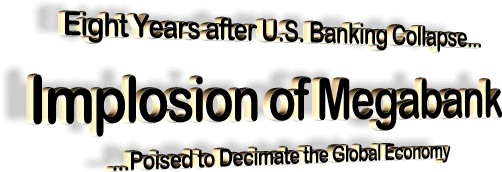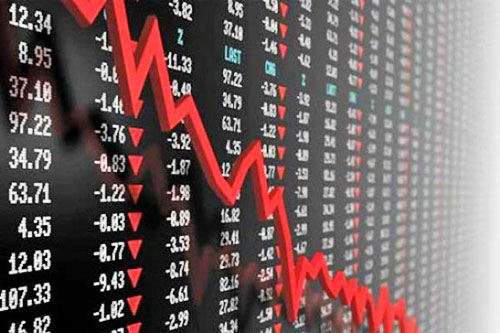|

by Jay Syrmopoulos
29 September 2016
from
TheLastAmericanVagabond Website

Berlin, Germany
The most prominent bank in Germany is at
risk of failure, with potentially profound effects for the EU, the
United States and likely the rest of the world.
Deutsche Bank shares have fallen
sharply on the news that German Chancellor Angela Merkel
won't bail-out the struggling bank, with shares falling by as much
as six percent in early Monday trading, making it the worst
performance since 1992.
Since January, the bank's shares have
lost over 52 percent of their value.
Merkel also refused to provide financial assistance to Deutsche Bank
in its legal battle with the U.S. Department of Justice.
The chancellor made her position clear
during talks with Deutsche CEO John Cryan, according to Focus
magazine. The German-based lender may be fined up to $14 billion
over its mortgage-backed securities business before
the 2008 global crisis.
The German Chancellor also noted that Deutsche Bank will not be
getting a bailout from the European Central Bank - the lender of
last resort for European banks.
So could Germany be considering a bail-in instead of a bail-out?
According to Investopedia:
A bail-in is rescuing a financial
institution on the brink of failure by making its creditors and
depositors take a loss on their holdings.
A bail-in is the opposite of a
bail-out, which involves the rescue of a financial institution
by external parties, typically governments using taxpayers
money.
Typically, bail-outs have been far
more common than bail-ins, but in recent years after massive
bail-outs some governments now require the investors and
depositors in the bank to take a loss before taxpayers.
So the question becomes:
are millions of Germans about to see
their savings stolen by the government to prop up Deutsche Bank?
It's not at all beyond the realm of
possibility, as it has happened before in very recent history.
To keep the bank solvent, the Bank of
Cyprus took almost 40% of depositor's funds - leaving customers with
essentially nothing they could do about having their money stolen.
Assets were frozen and ATM machines were not refilled.
Perhaps this explains why in mid-August
Germans were told by their government
to stockpile 10 days worth of water, and 5 days worth of food in
case of a "national emergency" hitting the country.
Deutsche Bank's unbelievably risky portfolio and it's exposure to
the derivative markets, which stands at over $40 trillion
dollars, would undoubtedly cause exponentially more damage than the
Lehman Brothers collapse did back in 2008, which precipitated the
Great Recession of 2008.
The collapse of Deutsche Bank would most likely begin a cascade of
Western banking institutions falling like dominos, which could
include,
-
Barclays in London
-
CitiGroup in the U.S.
According to same expert who valued
Lehman's worth at it's collapse, Deutsche Bank's current value of $1
trillion dollars is significantly more than Lehman Brothers
valuation during their collapse in 2008.
The contagion from a collapse of this magnitude could potentially
trigger a systemic banking collapse the likes of which the Western
world has never seen. The EU would almost certainly
disintegrate upon a failure of this magnitude.
Revealing
the truly dangerous threat the
German megabank poses, a report from the International Monetary Fund
in June implied that Deutsche Bank was a threat to the global
financial system.
Of all the world's big banks,
the IMF said,
"Deutsche Bank appears to be the
most important net contributor to systemic risks."
Add to that the fact that international
financiers
Jacob Rothschild and
George Soros have both, over the past few months,
advised investors to get out of the investment market and advocated
for gold investments - and it becomes very clear that this collapse
has been
on the horizon for sometime.
When Jacob Rothschild says that he is buying gold because the
central banks are out of control, you begin to understand the scope
and magnitude of what is transpiring, as his family has been in de
facto control of the world's central banks for centuries.
In his
semi-annual address to shareholders
of
RIT Capital Partners, Jacob
Rothschild, announced that they are reducing stock market and
currency exposure and increasing their gold holdings, warning that
the world is now in "uncharted waters" and that the consequences are
"impossible" to predict.
Rothschild stated:
"The six months under review have
seen central bankers continuing what is surely the greatest
experiment in monetary policy in the history of the world.
We are therefore in uncharted waters and it is impossible to
predict the unintended consequences of very low interest rates,
with some 30% of global government debt at negative yields,
combined with
quantitative easing on a
massive scale."
But here's the rub, it's not impossible
to predict at all - there's going to be a gigantic global crash.
When the government warnings start, you can be assured that it's
already too late, as the availability of supplies in the case of
emergency would be severely constrained after a warning due to the
large number of people attempting to procure an extremely limited
amount of supplies.
To a much lesser degree, these types of events have happened in both
Greece and Venezuela recently, and it's highly possible that we're
about to watch history repeat itself on a much larger scale if
Deutsche Bank fails.
Will Germany become the powder keg that implodes the global economy?
Only time will tell...
What is certain is that an ounce of prevention, ahead of any
potential collapse, is the most viable solution for those looking to
safeguard themselves and their families. The key is to stock up on
food, water and other necessities in advance of the actual crisis
fully manifesting.
A minimal amount of effort put into
preparing early for the side effects of a major economic disaster
could be the difference between surviving the crisis or not for your
family...
|


